- Home
- Quizzes
- My Quiz Activity
- Newsletters
- Sports Betting
- MY FAVORITES
- Add Sports/Teams
- SPORTS
-
NFL
- NFL Home
- Arizona Cardinals
- Atlanta Falcons
- Baltimore Ravens
- Buffalo Bills
- Carolina Panthers
- Chicago Bears
- Cincinnati Bengals
- Cleveland Browns
- Dallas Cowboys
- Denver Broncos
- Detroit Lions
- Green Bay Packers
- Houston Texans
- Indianapolis Colts
- Jacksonville Jaguars
- Kansas City Chiefs
- Las Vegas Raiders
- Los Angeles Chargers
- Los Angeles Rams
- Miami Dolphins
- Minnesota Vikings
- New England Patriots
- New Orleans Saints
- New York Jets
- New York Giants
- Philadelphia Eagles
- Pittsburgh Steelers
- San Francisco 49ers
- Seattle Seahawks
- Tampa Bay Buccaneers
- Tennessee Titans
- Washington Commanders
-
MLB
- MLB Home
- Arizona Diamondbacks
- Atlanta Braves
- Baltimore Orioles
- Boston Red Sox
- Chicago White Sox
- Chicago Cubs
- Cincinnati Reds
- Cleveland Guardians
- Colorado Rockies
- Detroit Tigers
- Houston Astros
- Kansas City Royals
- Los Angeles Angels
- Los Angeles Dodgers
- Miami Marlins
- Milwaukee Brewers
- Minnesota Twins
- New York Yankees
- New York Mets
- Oakland Athletics
- Philadelphia Phillies
- Pittsburgh Pirates
- San Diego Padres
- San Francisco Giants
- Seattle Mariners
- St. Louis Cardinals
- Tampa Bay Rays
- Texas Rangers
- Toronto Blue Jays
- Washington Nationals
-
NBA
- NBA Home
- Atlanta Hawks
- Boston Celtics
- Brooklyn Nets
- Charlotte Hornets
- Chicago Bulls
- Cleveland Cavaliers
- Dallas Mavericks
- Denver Nuggets
- Detroit Pistons
- Golden State Warriors
- Houston Rockets
- Indiana Pacers
- Los Angeles Clippers
- Los Angeles Lakers
- Memphis Grizzlies
- Miami Heat
- Milwaukee Bucks
- Minnesota Timberwolves
- New Orleans Pelicans
- New York Knicks
- Oklahoma City Thunder
- Orlando Magic
- Philadelphia 76ers
- Phoenix Suns
- Portland Trail Blazers
- Sacramento Kings
- San Antonio Spurs
- Toronto Raptors
- Utah Jazz
- Washington Wizards
-
NHL
- NHL Home
- Anaheim Ducks
- Arizona Coyotes
- Boston Bruins
- Buffalo Sabres
- Calgary Flames
- Carolina Hurricanes
- Chicago Blackhawks
- Colorado Avalanche
- Columbus Blue Jackets
- Dallas Stars
- Detroit Red Wings
- Edmonton Oilers
- Florida Panthers
- Los Angeles Kings
- Minnesota Wild
- Montreal Canadiens
- Nashville Predators
- New Jersey Devils
- New York Islanders
- New York Rangers
- Ottawa Senators
- Philadelphia Flyers
- Pittsburgh Penguins
- San Jose Sharks
- Seattle Kraken
- St. Louis Blues
- Tampa Bay Lightning
- Toronto Maple Leafs
- Vancouver Canucks
- Vegas Golden Knights
- Washington Capitals
- Winnipeg Jets
- NCAAF
- NCAAM
- Boxing
- Entertainment
- Lifestyle
- Golf
- MMA
- Soccer
- Tennis
- Wrestling
- More Sports
- RESOURCES
- My Account
- YB on Facebook
- YB on Twitter
- YB on Flipboard
- Contact Us
- Privacy Policy
- Terms of Service

Hitsville USA: The 20 greatest Motown singles
In January 1959, a little-known songwriter named Berry Gordy took $800 he scrounged together from family — along with meager royalties he earned writing "Lonely Teardrops" for Jackie Wilson — to found Tamla Records, better known as Motown Records. Some 60-plus years later, Motown stands as a piece of living history — a flashpoint where African-American recording artists would find mainstream success. These include names like Marvin Gaye, Diana Ross, Smokey Robinson, Michael Jackson, Lionel Richie, Stevie Wonder and Rick James, along with a multitude of others. To celebrate the superior soul straight outta Hitsville, U.S.A., we share our list of the 20 best Motown singles ever made.
20. "Nightshift" - The Commodores (1985)

Hot 100: No. 3
The title track for the Commodore's second album since Lionel Richie left the band, "Nightshift" is a solemn and soulful tribute to two of Detroit's most beloved performers, Jackie Wilson and Marvin Gaye, both of whom died in 1984. Interestingly enough, the Commodores were initially against the release of "Nightshift," but it stands as the band's highest-charting single post-Richie and also garnered a Grammy for Best Vocal R&B Performance by a Duo/Group.
19. “Please Mr. Postman” - The Marvelettes (1961)
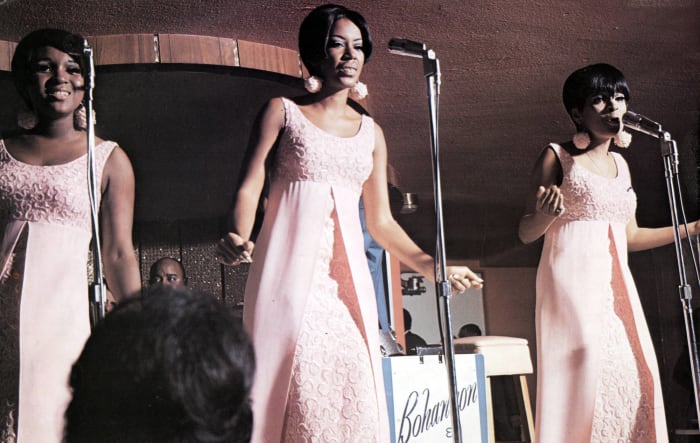
Hot 100: No. 1
A hit right out of the gate for Gordy, the Marvelettes, a prototype of sorts for the type of girl group that would find perfection in the soon-to-follow Supremes, deliver a bubble gum poppy track that fit right in as a crossover smash for the time and became an instant classic that still evokes memories for an entire era. Future Motown legend Marvin Gaye can be heard on drums, a point of trivia not widely known, but it serves an example of how tightly knit things were at Hitsville, U.S.A.
18. "Money (That's What I Want)" - Barrett Strong (1959)

Hot 100: No. 23
You might not remember the name Barrett Strong, but you certainly remember the song. "Money (That's What I Want)" represents Motown's first hit for the fledgling label, still known at the time as Tamla Records. The song was subsequently covered by a number of acts, most notably The Beatles, who released their version on Nov. 22, 1963 (the same day John F. Kennedy was assassinated). Strong would later sue Gordy and Motown for writing credit, something Gordy would fight for years. Regardless, "Money (That's What I Want)" remains the rock upon which Motown would build its long road of success going forward.
17. “Signed, Sealed, Delivered I'm Yours” - Stevie Wonder (1970)

Hot 100: No. 3
At the young age of 20, Stevie Wonder was already an established artist for Motown, but starting with “Signed, Sealed, Delivered I'm Yours,” Wonder firmly established himself as a hit generator in his own right. This started a hot streak for him musically that would see the performer go on to what could be best described as a soulful journey, encompassing highlights such as the birth of his children juxtaposed against a cultural explosion, as African-Americans began to embrace their heritage, playing itself out through fashion and music.
16. “Papa Was a Rollin' Stone" - The Temptations (1971)
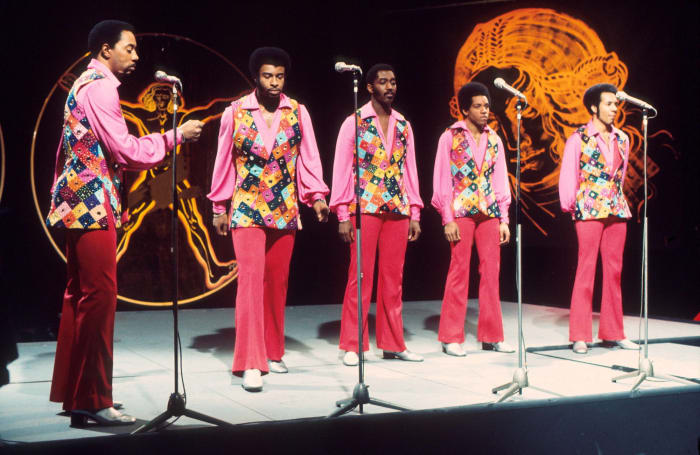
Hot 100: No. 1
This was a psychedelic, funky tune that was both welcome and yet unexpected from The Temptations. Originally written for The Undisputed Truth, the song was rejiggered and expanded into a 12-minute opus that served as a last go-round for the original and most popular incarnation of the group, and it would also signal its final No. 1 hit and Grammy. What works so well here is not so much the tried-and-true Motown sound but rather how that sound evolved, heavily influenced by the rising Sound of Philadelphia via TSOP Records, which for the first time posed a serious challenge to Motown's superiority in a way other labels never could.
15. "Dancing in the Street" - Martha Reeves and the Vandellas (1964)

Hot 100: No. 2
A signature song for Motown's golden era, "Dancing in the Street" found itself the subject of many cover efforts from white acts like Van Halen, Mick Jagger and David Bowie, but nothing comes close to the original from girl group Martha Reeves and the Vandellas. Despite its pop demeanor, the song found itself adopted as an anthem of sorts for the civil rights movement of the '60s, as the joyful sound carried with it a sense of cultural defiance in the midst of summers filled with riots and general unrest. For lack of a better term, "Dancing in the Streets" was a celebration of blackness in a time when a sense of pride was needed to wade through the struggles.
14. "Stop! In the Name of Love" - The Supremes (1965)
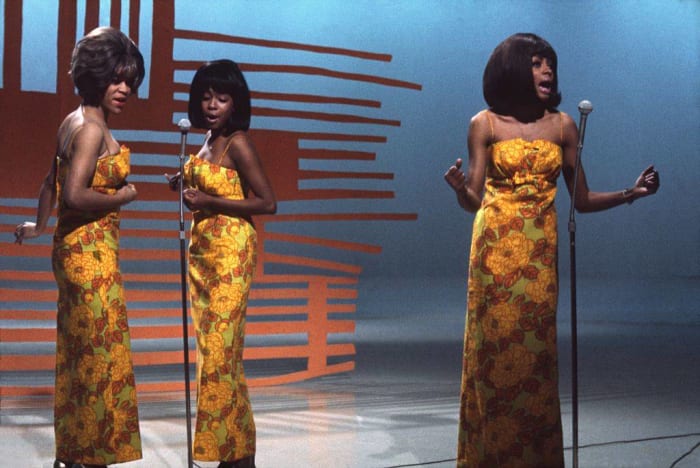
Hot 100: No. 1
Sitting atop the pop charts for three weeks, "Stop! In the Name of Love" is another signature track for both Motown and the Diana Ross-led Supremes, who were in the midst of a record 12 songs that would reach the top spot on the charts. Featuring the best of Hitsville, U.S.A.'s production team, the track is both urgent and danceable. For completists, this may be the most memorable of the Supremes catalog that truly showcases the vocal talents of not just Ross but also of her equally capable bandmates, Mary Wilson and Florence Ballard.
13. "Super Freak" - Rick James (1981)
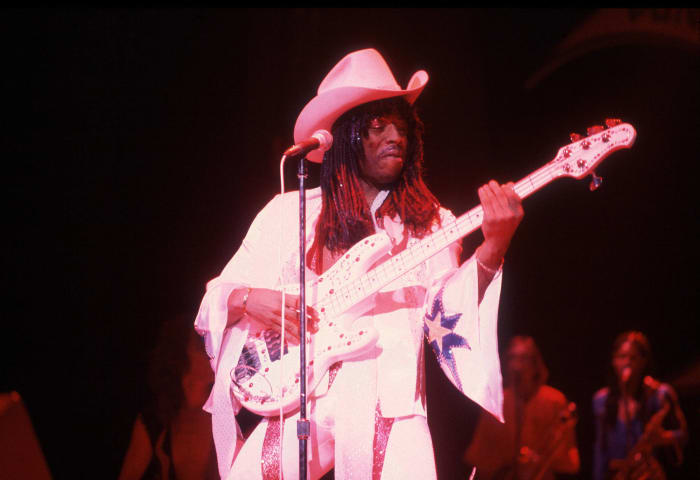
Hot 100: No. 16
By the end of the '70s, Motown shifted back toward developing a new age of performers while embracing the post-disco funk that drove bands like Parliament and Funkadelic. Gordy had a secret weapon in Rick James, an androgynous sex symbol who looked and acted unlike any other act on Motown's roster. In 1981 James released "Street Songs," arguably the best album of the singer-songwriter's career, containing "Super Freak," a funky dance track with a heavy bass line that had instant crossover appeal. Instantly infectious, "Super Freak" is James at his best, slinging sex and rhythm in equal amounts in a party song that lives on in popularity to this day.
12. “I Heard it Through the Grapevine” - Marvin Gaye (1968)
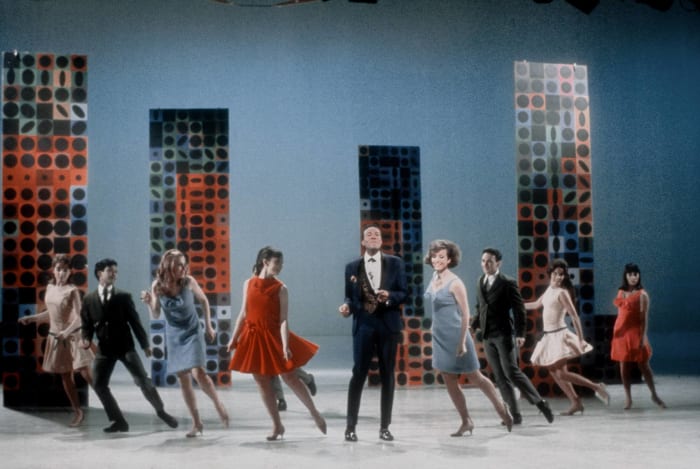
Hot 100: No. 1
At Motown, all good songs are run through a number of performers before it is decided who would release what and when. In 1966 Norman Whitfield and Barrett Strong (remember him?) wrote "I Heard it Through the Grapevine," originally for Gladys Knight and the Pips, making it up to No. 2 on the Hot 100 charts. The song was then passed to Smokey Robinson and the Miracles before landing on the doorstep of Motown's favorite son: Marvin Gaye. Gaye's version, unsurprisingly, is the one that stood the test of time and served as a signature of his earlier career following the devastating collapse of partner Tammi Terrell, who would die of brain cancer in 1970.
11. "Living for the City" - Stevie Wonder (1973)
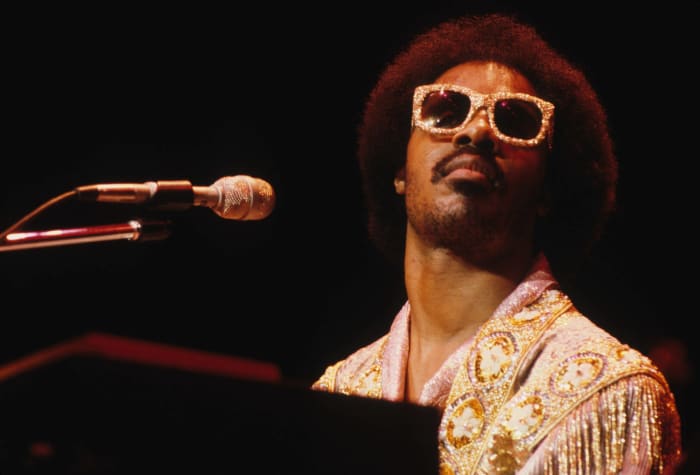
Hot 100: No. 3
As much as Motown was about producing crossover hits, the label never shied away from provocative protest anthems, and Stevie Wonder's "Living for the City" stands as one of Motown's greatest. The second single from Wonder's groundbreaking "Innervisions" album, "Living for the City" is a powerful take on issues such as race and poverty during a time in the '70s when such subjects were only lightly broached. Wonder astounds, as he's responsible for playing and looping all instruments on the track, something rarely done today, showing the work of a true icon in full flight.
10. “War” - Edwin Starr (1969)
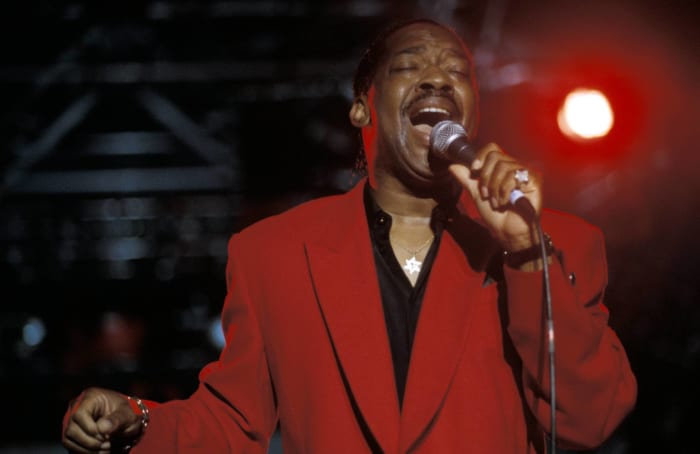
Hot 100: No. 1
"War" is a peculiar entry in Motown's oeuvre, as the anti-Vietnam War anthem was recorded simultaneously by both the Temptations and Edwin Starr. While the Temptations' version was more solemn, Starr's vocals exploded all over the track with a forceful intensity that led the label to push his version all the way to No. 1 on the charts. Where "War" would've been a one-off for the Temptations, a song of little consequence, for Starr it was a career-making track and one that buoyed his career in a way that served as yet another feather in Motown's cap of chart success.
9. "I Want You Back" - Jackson 5 (1969)
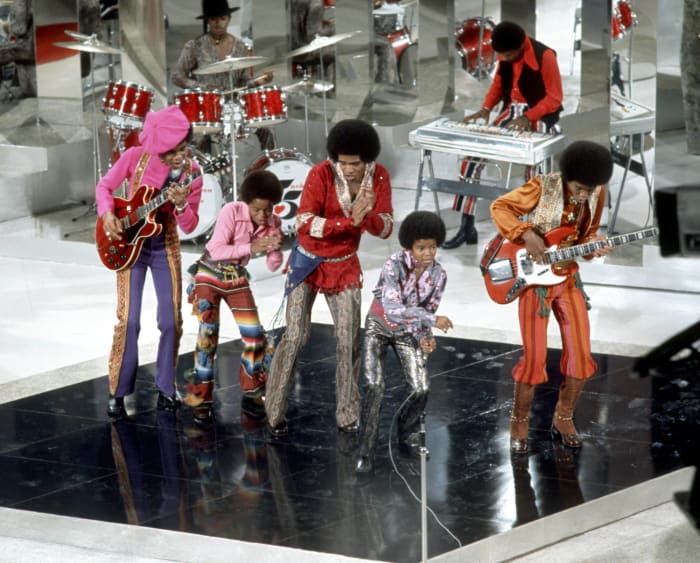
Hot 100: No. 1
Featuring an 11-year-old Michael Jackson on vocals, "I Want You Back" was the breakout single for the Jackson 5, hailing from Gary, Indiana. Diana Ross was credited with discovering the quintet, using the hit to ease her transition into a solo career, although others have disputed this claim. Regardless of the truth, the song is the perfect coming out party for a band of brothers whose crown jewel younger sibling would take his first steps toward becoming the undisputed King of Pop.
8. "Let's Get it On" - Marvin Gaye (1971)

Hot 100: No. 1
As Motown's most prolific artist by far, Marvin Gaye went through a number of phases, and his work has always been better for it. In 1971 Gaye's success was largely rooted in the cultural phenomenon that was "What's Going On?" "Let's Get it On" goes on a much different, and carnal, path, as Gaye creates what would become the babymaking anthem for more than one generation. The sound is seductive and earthy without unnecessary whining or theatrics. Gaye is here to make love to his audience, and it works better than practically any other ballad released during the remainder of the decade.
7. “Tracks of My Tears” - Smokey Robinson and the Miracles (1965)
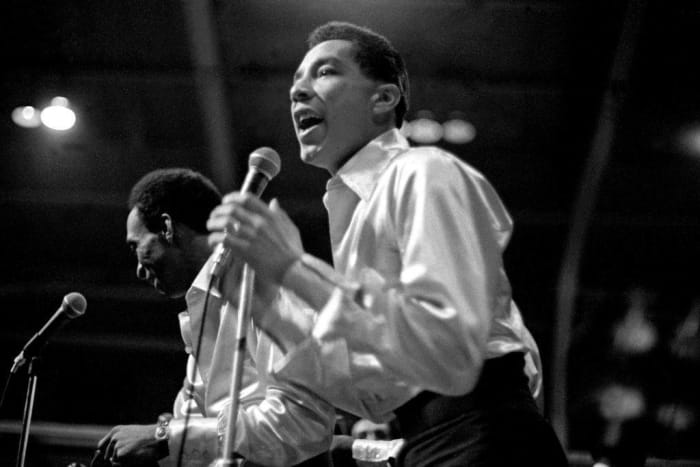
Hot 100: No. 16
As one of Motown's founding acts, Smokey Robinson and the Miracles represented the reliable backbone of the label, largely due to Robinson's ability to both write and perform crossover hits. "Tracks of My Tears" is quite possibly the best and most remembered of the group's career, with a popularity shared both by fans and fellow musicians, as it has been covered with great success by acts like Linda Ronstadt and Johnny Rivers.
6. "Ain't No Mountain High Enough" - Marvin Gaye and Tammi Terrell (1967)
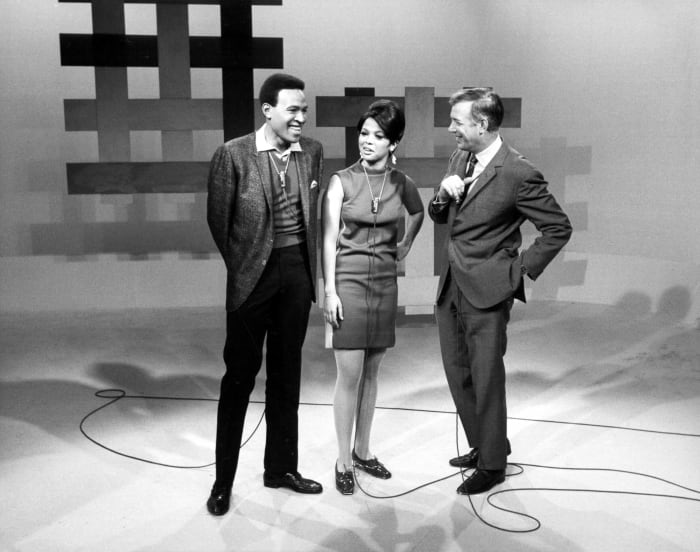
Hot 100: No. 1
As duets go, there are few more memorable and yet more tragic than Marvin Gaye and Tammi Terrell. Considered one of the most important records released by Motown, the song, written by husband and wife duo Nick Ashford and Valerie Simpson, is a simple love ballad taken to even greater heights by Gaye and Terrell, who, while never a couple, seemed inseparable both in substance and style. And it showed in their music. The real tragedy here is that soon after their version was released, Terrell would collapse in Gaye's arms during a live performance, later succumbing to the cancer that robbed Gaye of a partner and audiences everywhere of a true talent.
5. “I Can't Help Myself (Sugar Pie Honey Bunch)” - The Four Tops (1965)
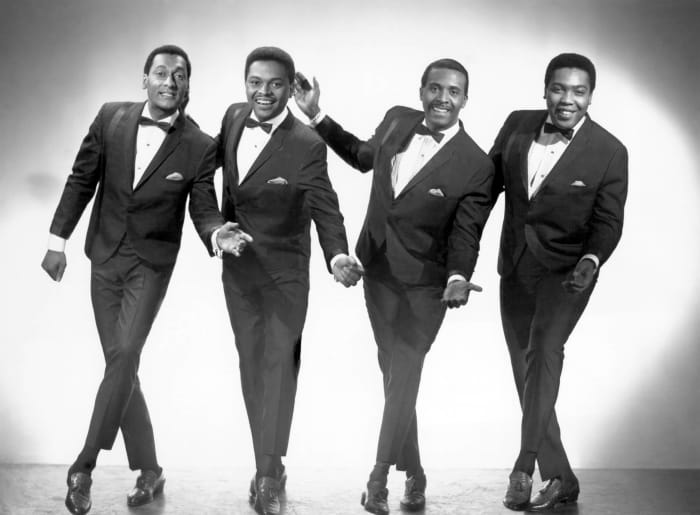
Hot 100: No. 1
Spending two weeks atop both the Hot 100 and R&B charts, "I Can't Help Myself (Sugar Pie Honey Bunch)" may be one of the most memorable Motown hits, existing in that special era of the first five years of the label. It's a pure example of the hit-making power of the Holland-Dozier-Holland production team. But as well-written and produced as the material was, without the bellowing vocals of lead singer Levi Stubbs, it's difficult to imagine this song as the classic it is more than five decades later.
4. “Baby Love” - The Supremes (1964)
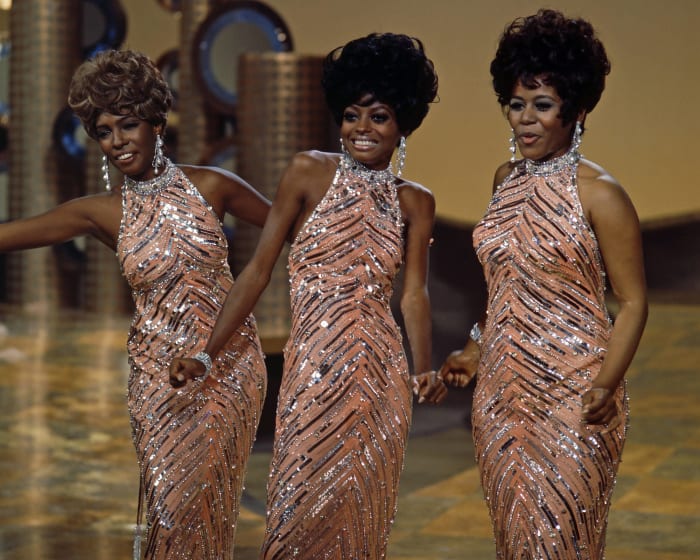
Hot 100: No. 1
The Supremes and their songwriting team of Holland-Dozier-Holland planted their flag in the pop music scene with their second studio album, "Where Did Our Love Go?," featuring hits in the title track and in what stands as the group's signature song, "Baby Love." With Motown's prized chanteuse, Diana Ross, as the heart and soul of the trio, their hit "Baby Love" is a playful composition that serves as the first in a long line of No. 1 singles, setting a record with 12, a mark that has yet to be matched by any other girl group.
3. “Reach Out (I’ll Be There)” - The Four Tops (1966)
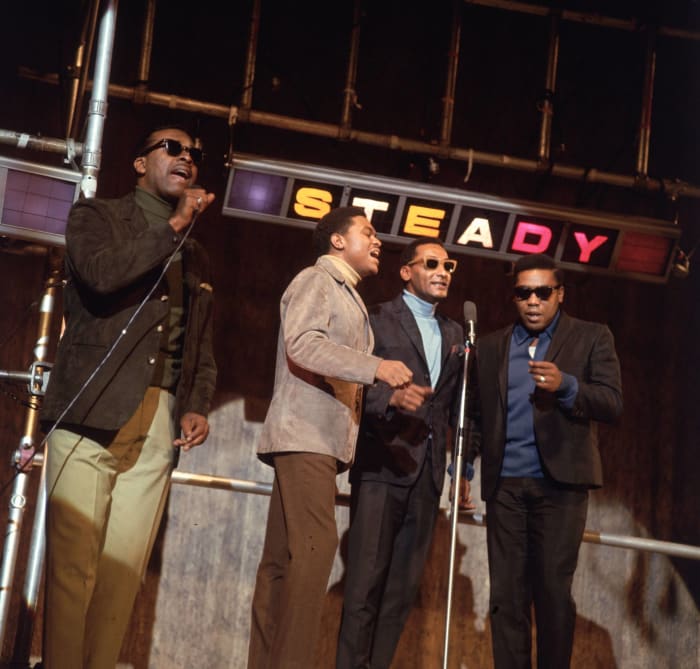
Hot 100: No. 1
The signature track for the Four Tops, "Reach Out (I'll Be There)," also represents Motown at the height of its power in the '60s. Written by the label's powerhouse production team of Holland–Dozier–Holland, the song continued Motown's crossover success, as it spent two weeks at No. 1 on both the U.S. R&B and Hot 100 charts. The song's success lies in its frenetic delivery matched with the strongman vocals of lead singer Levi Stubbs, who alternates seamlessly between singing and shouting, giving the track an infectious urgency that cements it as a true classic.
2. "My Girl" - The Temptations (1964)
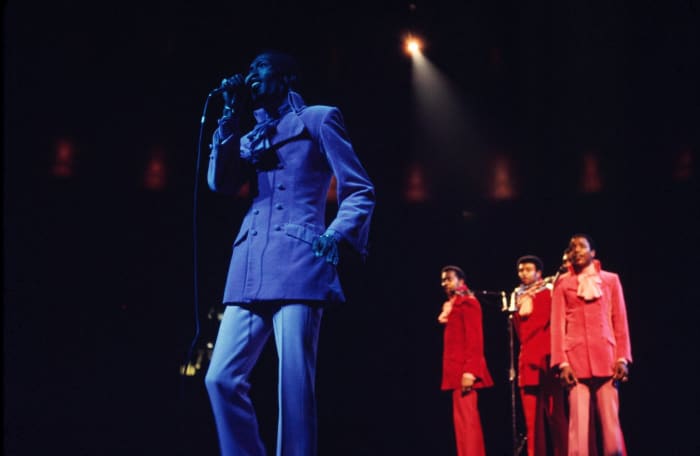
Hot 100: No. 1
Written and produced by Smokey Robinson and the Miracles member Ronald White, "My Girl" is a breakout song for Motown stalwarts The Temptations. Not only is it the first single to feature David Ruffin on lead vocals, but it also was the first No. 1 hit for the group, which would experience its greatest success with the lineup featured in the song. As a Motown standard, "My Girl" stands in the upper echelon of the label's many hits.
1. "What's Going On?" - Marvin Gaye (1971)
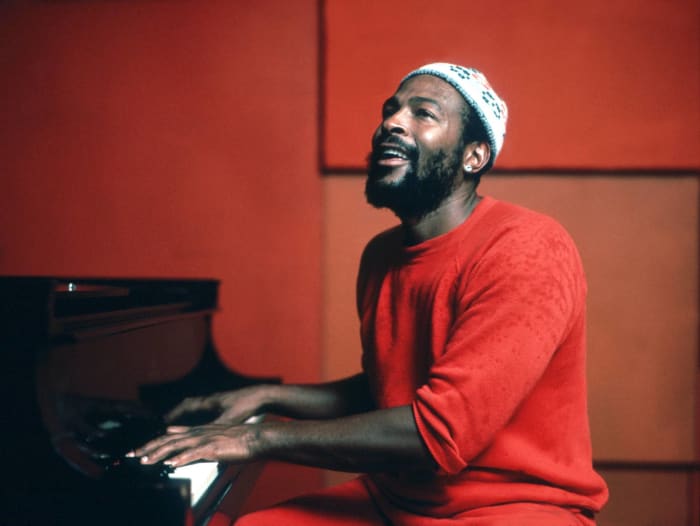
Hot 100: No. 27
The title track from what's arguably Marvin Gaye's most significant work, "What's Going On?" is a ballad of consciousness, painting a tapestry of the era and serving as a time capsule, giving a glimpse of America at a crossroads. At the time of the song's release, the country was enduring a number of ills, such as Vietnam and the struggle of African-Americans, and there was a general malaise, forcing everyone to take a look in the mirror to see exactly what the title suggests. Here, Gaye sings about a love far removed from romance, but rather of one's fellow man, woman and child. "What's Going On?" represents the best of Motown and is every bit as important historically as the label itself.
More must-reads:
Trending in Entertainment
Customize Your Newsletter
 +
+
Get the latest news and rumors, customized to your favorite sports and teams. Emailed daily. Always free!
Use of this website (including any and all parts and
components) constitutes your acceptance of these
Terms of Service and Privacy Policy.

